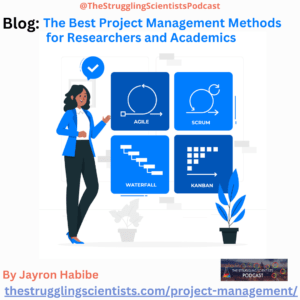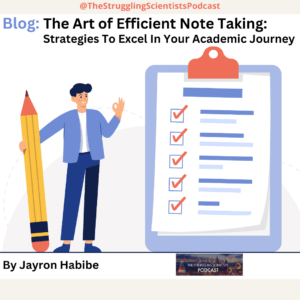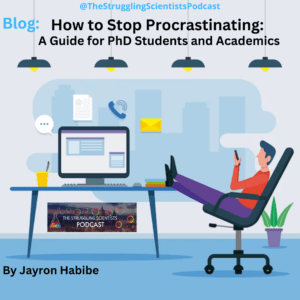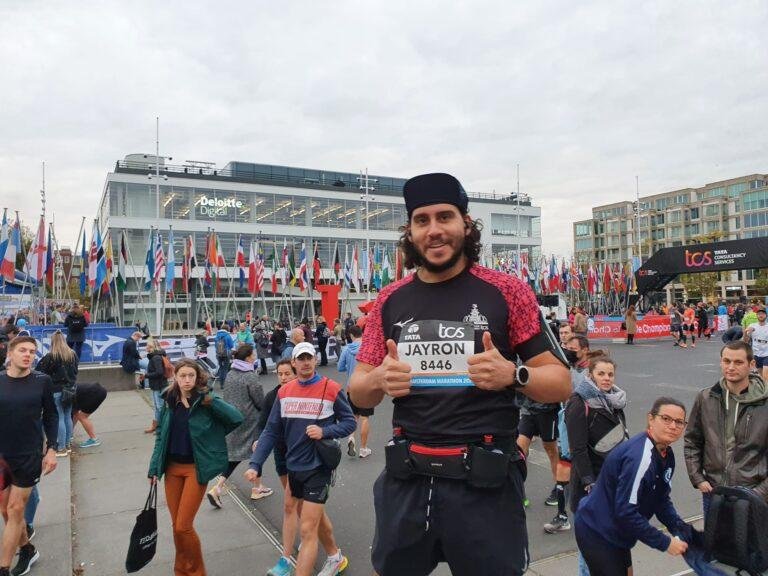What is a Marathon?
Doing a PhD is often compared to running a marathon. But what is a marathon exactly? A marathon is a long-distance race that covers a distance of 26.2 miles or 42.195 kilometers. It is a popular sport that requires endurance, stamina, and mental fortitude. Marathons are usually organized as public events, where thousands of runners participate and compete with each other.
Many people have running a marathon on their bucket lists because it is so challenging. For a more in-depth look at whether running a marathon is healthy for you or not check out our previous blog. Or if you prefer, you could also check out our episode on it down below.
In any case, back in 2021 I decided to register for the Amsterdam marathon during the 3rd year of my PhD. The reason being that I had already run a half marathon during covid and I wanted to see if I had what it takes to do the full marathon before I turn 30.
Additionally, I was not in the best mental space at that time and wanted/needed a pursuit that would shift my attention from all the negative stuff going on with my PhD to something more positive. Hence, I decided to run Amsterdam.
Many of the things I learned are specific to running but several of them also apply to the PhD. So from someone who is finishing their PhD in June 2023 and who will be running his second marathon this year, here are 6 things I learned from training for and running the Amsterdam marathon.
1. Show up
Doing a PhD or a marathon is daunting, especially at the start.
Since you’ve never done either, you have no idea if what you’re doing is correct or enough. All you know for sure is that you can keep showing up and do your best every day whatever that looks like.
By building up consistency you get in the necessary repetitions you will need to learn what matters and what doesn’t during either.
Most people stumble at this part, because consistency is boring. It gets boring running 3-5 times a week, the same old routes you always run. So naturally most people will sooner lean towards either skipping a run due to lack of motivation or going out of their way to spice things up to stay motivated.
The unfortunate truth though is that things will suck. Sooner or later the motivation will go away and the sucky parts will rear their heads. The motivation that helped you get started won’t be enough anymore and you will need something different to carry you to the (metaphorical) finish line. Hence, why its important to keep showing up.
🏃:
If I only showed up for training on the days when I felt like it I never would have been able to do the run.
🧑🔬:
There were many days I thought about quitting.
But, every day I showed up got me closer to finishing my PhD.
2. Dedicated training plan
You don’t run a marathon without a training plan, same for the PhD. Training helps get you from where you are to where you need to be. What I found so valuable about this lesson is that it gave me a framework for making better and quicker decisions which would help me get the desired outcomes for both the PhD and the marathon.
In my case, my training was 4 months long with 4-5 training sessions a week. Each week the amount of Kilometres/ miles went up and each of my runs served a different purpose. The benefit of having such a plan is that it removes you from having to decide daily what you are going to do and provides a structure for both your intense work as well as dedicated rest times.
Here’s how having a dedicated training came to play during both my training as well as my PhD:
🏃: Not every day goes to plan. But having a plan to fall back to when I had to miss training helped me get right back into it. This was expecially true in those weeks when I was really struggling.
🧑🔬:
During the PhD many things didn’t go to plan, but knowing what the next step ought to be helped me keep moving forward and get my thesis done.
3. Pacing
Both a PhD and marathon take a long time to finish. Which is why you need to pace yourself.
Too fast, and you will tire/ burn out.
Too slow, and you won’t finish at all.
Finding your pace will take time and honesty with yourself but will make all the difference for your performance in the long run.
During my training, I was initially aiming for a sub 4 hr pace, but along the way started realizing that I could go faster perhaps even sub 3.5hr. The catch though was that I had no idea if I would be able to sustain that pace for the full distance.
Finding your pace is not easy. It’s a thin line between the sustainable and max effort that is only achieved through consistency. Here is how my pacing played out for both my run and PhD.
🏃:
I had to give up on the goal of <3.5hr because I went too hard at the start.
Still finished in 3.38.34 though which I’m proud of of course🙂. However, I still wonder whether I would have been able to finish sooner had I just stuck with the 3.5hr pacing group instead of going out faster on my own.
🧑🔬:
I’m taking 5 years to finish my PhD instead of the 4 that I was provided.
While slower than hoped for, at least I’m finishing. Often our pace is not what we had wanted or expected but its the best we can muster in the moment.
4. Optimising
When starting a PhD or marathon training you will make mistakes.
Many of which you don’t even know about yet.
Along the way, you figure out what works and what doesn’t.
This is probably one of the biggest things I’ve taken away fromy my experience training for a marathon. It always starts out hard because you are literally starting from ground zero. Even going from the half to the full marathon isn’t as simple as just a doubling of the distance but its also a striking increase of several other factors.
It involved a 3.5x increase to my nutrition gel count from 2 to 7, more expensive running shoes, and more gear than I ever contemplated buying when I was “just” running the half. But that period of optimising exactly what does work made all the difference because it gave me the confidence on race day to know that I had put in the work and there were going to be no surprises.
Over time, you turn the seemingly impossible into the merely difficult.
🏃:
After 4 months of training I had dialed in which gear to bring, what my nutrition was going to be and more. That took a lot of time but it paid off.
🧑🔬:
Many failures paved the way for what would ultimately be published papers. Don’t even get me started on my last paper.
Great results come from many failures.
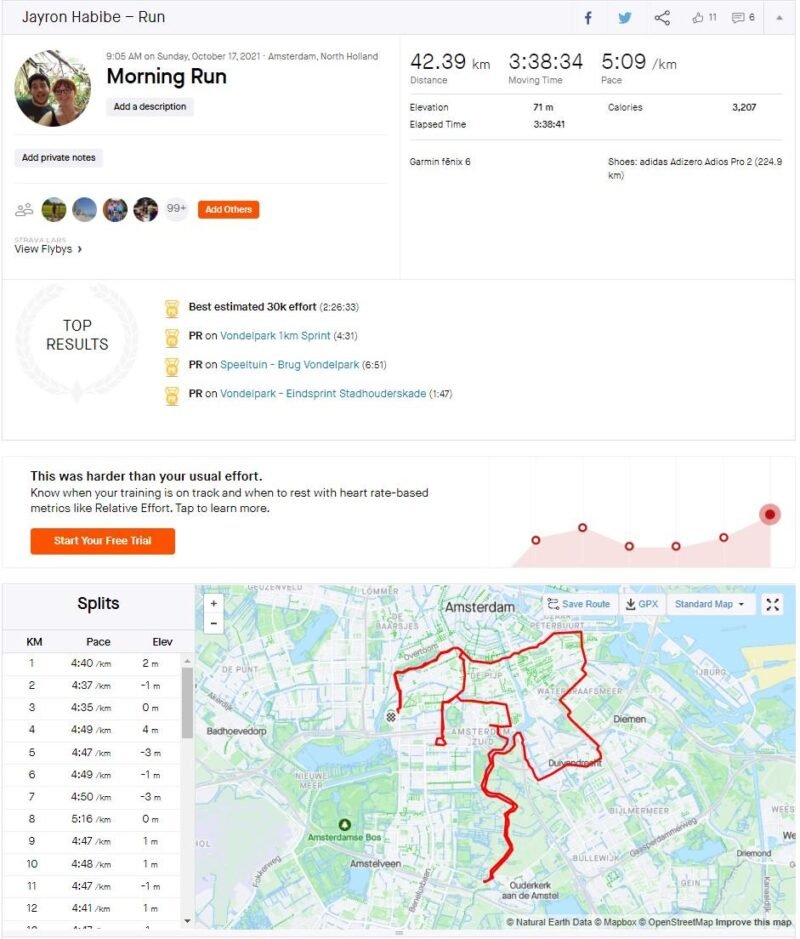
5. Multiple Goals
My goal was <4hr when I started training.
Anything can happen on the day itself which is why I set multiple goals just in case.
Multiple goals protect you from disappointment but also give you multiple things to aspire to if things do go well.
Here were my goals for my race.
Happy: finish
Good: run the entire thing
Great: <4hr
Amazing: <3.5hr
What is great about having multiple goals like this is that it takes into account that you are doing something you have never done before so just finishing it is a goal in and of itself. But, it also acknowledges that you are taking steps to make it more feasible with your training and your hard work so if everything goes right you might actually overshoot your initial goal.
Lastly, even though you are doing everything in your power to accomplish your goal there will always be things outside of your control. Some foreseeable and others not. The weather on the day of the run, covid regulations back in 2021. Almost anything could have made my run that day worse or even cancel it outright but I can’t control that so I just set my goals and work towards them as best I can.
Here’s what multiple goals looked like for me.
🏃:
Many things outside your control will influence your results, the best you can do is set your goals accordingly if you have a great or terrible day and just do your best.
🧑🔬:
Used this same approach with the most recent paper we got published. It was not an easy paper to get published and the project had taken quite awhile so I set my goals accordingly given that it was in the final year of my PhD.
Happy: submitted
Great: revisions
Amazing: accepted
6. You won't be the same person after it
Before the big run, there was a lot of doubt, uncertainty, and fear. Would I actually be able to do this?
What if this or that happen?
But after it was over, my negative thoughts and voices were silenced by the undeniable fact that I just ran my 1st marathon.
A lot needed to happen for me to get from where I was to the finish line of that run but a lot did happen. Not only physically but also emotionally and mentally. The path to even get to the starting line of the run was long and required a lot of sacrifice but the person I became after that experience was worth it.
Doubt and fear gave way to confidence.
🏃:
The doubts and fears that were present at the start of my 1st marathon gave way to the confidence to do another marathon this year.
🧑🔬:
I didn’t think I was capable of doing a PhD. With my defense date in June, I guess I need to accept that I was and am capable.

Conclusion
1. Show up
2. Dedicated training plan
3. Pacing
4. Optimising
5. Multiple goals
6. You won’t be the same person after it
In short, I learned a lot of different things through out my marathon journey. More than I’ll ever be able to truly put into words. The marathon is a transformative experience and that transformation carries over to other areas of your life including the PhD.
I can definitely recommend doing a marathon if you were ever interested in it because of how much it forces you to learn, grow and face the uncomfortable things in life. So with that said, I hope you enjoyed this blog and til next time folks!



